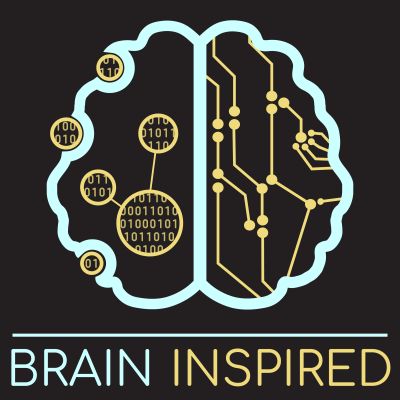Neuroscience and artificial intelligence work better together. Brain inspired is a celebration and exploration of the ideas driving our progress to understand intelligence. I interview experts about their work at the interface of neuroscience, artificial intelligence, cognitive science, philosophy, psychology, and more: the symbiosis of these overlapping fields, how they inform each other, where they differ, what the past brought us, and what the future brings. Topics include computational neuroscience, supervised machine learning, unsupervised learning, reinforcement learning, deep learning, convolutional and recurrent neural networks, decision-making science, AI agents, backpropagation, credit assignment, neuroengineering, neuromorphics, emergence, philosophy of mind, consciousness, general AI, spiking neural networks, data science, and a lot more. The podcast is not produced for a general audience. Instead, it aims to educate, challenge, inspire, and hopefully entertain those interested in learning more about neuroscience and AI.
https://braininspired.co/series/brain-inspired/
Gesamtlänge aller Episoden: 8 days 17 hours 30 minutes
BI 079 Romain Brette: The Coding Brain Metaphor
Romain and I discuss his theoretical/philosophical work examining how neuroscientists rampantly misuse the word code when making claims about information processing in brains. We talk about the coding metaphor, various notions of information, the differe
BI 078 David and John Krakauer: Part 2
In this second part of our conversation David, John, and I continue to discuss the role of complexity science in the study of intelligence, brains, and minds. We also get into functionalism and multiple realizability, dynamical systems explanations, the
BI 077 David and John Krakauer: Part 1
David, John, and I discuss the role of complexity science in the study of intelligence. In this first part, we talk about complexity itself, its role in neuroscience, emergence and levels of explanation, understanding, epistemology and ontology, and real
BI 076 Olaf Sporns: Network Neuroscience
Olaf and I discuss the explosion of network neuroscience, which uses network science tools to map the structure (connectome) and activity of the brain at various spatial and temporal scales. We talk about the possibility of bridging physical and function
BI 075 Jim DiCarlo: Reverse Engineering Vision
Jim and I discuss his reverse engineering approach to visual intelligence, using deep models optimized to perform object recognition tasks. We talk about the history of his work developing models to match the neural activity in the ventral visual stream,
BI 074 Ginger Campbell: Are You Sure?
Ginger and I discuss her book Are You Sure? The Unconscious Origins of Certainty, which summarizes Richard Burtons work exploring the experience and phenomenal origin of feeling confident, and how the vast majority of our brain processing occurs outside
BI 073 Megan Peters: Consciousness and Metacognition
Megan and I discuss her work using metacognition as a way to study subjective awareness, or confidence. We talk about using computational and neural network models to probe how decisions are related to our confidence, the current state of the science of
BI 072 Mazviita Chirimuuta: Understanding, Prediction, and Reality
Mazviita and I discuss the growing divide between prediction and understanding as neuroscience models and deep learning networks become bigger and more complex. She describes her non-factive account of understanding, which among other things suggests tha
BI 071 J. Patrick Mayo: The Path To Faculty
Patrick and I mostly discuss his path from a technician in the then nascent Jim DiCarlo lab, through his graduate school and two postdoc experiences, and finally landing a faculty position, plus the culture and issues in academia in general. We also cove
BI 070 Bradley Love: How We Learn Concepts
Brad and I discuss his battle-tested, age-defying cognitive model for how we learn and store concepts by forming and rearranging clusters, how the model maps onto brain areas, and how hes using deep learning models to explore how attention and sensory in
